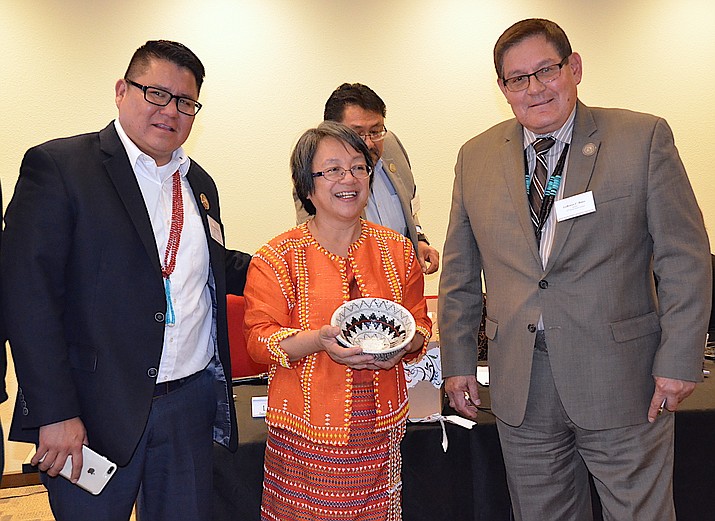U.N. Special Rapporteur visits Navajo Nation, speaks on energy development
Navajo Nation Council members welcomed United Nations Special Rapporteur on the Rights of Indigenous Peoples, Victoria Tauli-Corpuz, to the Navajo Nation to engage in interactive dialogue with Navajo leaders and citizens regarding the potential effects of energy development on Navajo land. Submitted photo
TSE BONITO, N.M. — Navajo Nation Council members welcomed United Nations Special Rapporteur on the Rights of Indigenous Peoples, Victoria Tauli-Corpuz, to the Navajo Nation to engage in interactive dialogue with Navajo leaders and citizens regarding the potential effects of energy development on Navajo land.
The Navajo Nation Human Rights Commission hosted the Regional Indigenous Consultation in collaboration with the University of Colorado College of Law. Special Rapporteur Tauli-Corpuz and the college chose various areas to visit and selected the Navajo Nation as the first stop on the tour.
Speaker of the 23rd Navajo Nation Council LoRenzo Bates (Nenahnezad, Newcomb, San Juan, Tiis Tsoh Sikaad, Tse’Daa’Kaan, Upper Fruitland) welcomed the Special Rapporteur to the Navajo Nation and presented a traditional Navajo pottery bowl to Tauli-Corpuz, as a token of gratitude for visiting the Navajo Nation.
“We are very honored that the Special Rapporteur is taking the time to visit the Navajo Nation, and we want to convey our appreciation to her,” Bates said. “It is also important to note that the Navajo Nation is the only indigenous Nation with a human rights commission and interfaces with various entities locally, nationally, and internationally.”
Bates said that although the Navajo Nation relies on the fossil fuel industry to generate over 60 percent of the Navajo Nation’s net revenues, there are important steps in place to ensure the overall safety of communities, as well as obtaining “free, prior, and informed consent” of Navajo land owners and communities
Council Delegate Nathaniel Brown (Chilchinbeto, Dennehotso, Kayenta), who provided the opening prayer for the consultation, also spoke on human rights issues on the Navajo Nation pertaining to the importance of protecting “sites of religious, cultural, and historical significance,” and how they may be impacted by energy development.
“While the Navajo Nation continues to fight for the protection and preservation of sacred places on and off Navajo land, we cannot do it alone. I implore you, Special Rapporteur, to use the information and testimonies you have received today to generate a report that reflects the United States failure to secure ‘free, prior, and informed consent’ of indigenous people to aid in preserving not only cultural and religious sites, but our indigenous identities and integrity,” Brown said.
On Tuesday, Brown, along with the Navajo Nation Human Rights Commission, attended the “Intervention on Enabling the Participation of Indigenous Governing Institutions at the United Nations on Participation Modalities” to advocate for Navajo Nation to be an official member of the UN, in New York City, New York.
The delegation is advocating that the Navajo Nation have full participation in all United Nation activities, which includes the ability to attend all meetings with the understanding some meetings may be restricted, provide written documentations, and make oral statements especially when indigenous peoples want to reply to comments or statements made by other nation-states.
SUBMIT FEEDBACK
Click Below to:




